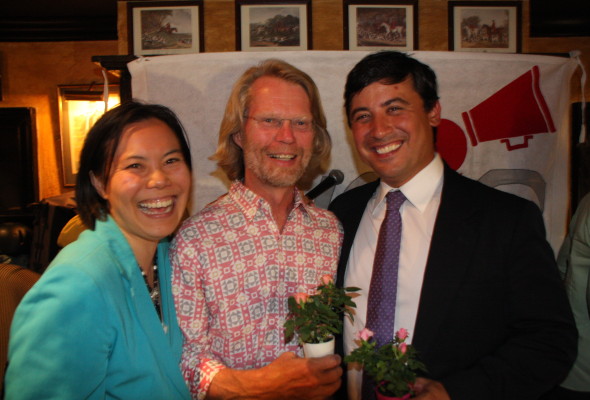On Monday September 8, WSIC hosted a full house at the Duke of York on the topic of giving MPs more freedom. Our two guest discussion leaders were Michael MacMillan (co-author with Alison Loat of “Tragedy in the Commons”) and Current MP for Wellington-Halton Hills Michael Chong. Michael Chong is currently explaining and promoting his private members bill (the Reform Act).
Michael MacMillan gave us a short description of his Toronto based charity Samara. It is one of the few places doing research into democracy. His recent book is an exploration of the accounts of approximately 80 MPs upon their leaving Ottawa and politics. He found that not only are exit interviews non-existent, but that MPs feel that no one seeks them out after they have left. One consistent theme emerged: parties have a disproportionate amount of power over MPs. This leads to a lack of individual agency for MPs.
Michael Chong has been through 5 general elections and has served in parliament for 10 years. He feels that decades of change with a focus on centralizing power in our government has weakened our democracy. Michael unequivocally stated that democracy is society’s most important achievement. This does not only mean the right to vote, but the fact that power is distributed fairly. He noted that in the American system of government there is a vote for a member of congress, a senator and the president. Also local political organizations are free to choose party members. In Canada, however, all party members are approved by the party leader meaning that citizens have effectively one vote: the one for the party leader. In practice most MPs dissent with their party 0% of the time. As a maverick he dissents 1% of the time. Contrasting with England he notes that it is not uncommon for his British counterparts to dissent 10-15% of the time.
Michael Chong’s Reform Act address three major themes to help redistribute power in Ottawa. It removes leader control over party nominations, democratizes the caucus rules, and makes party leaders accountable to their caucus.
The discussion that followed was lively and covered a wealth of topics. Should crown appointments be made by the house? (this would require constitutional change) Should we change the voting system? (7 out of 10 provinces explored the idea and it failed) Is Michael Chong an outsider? (No) Why not ban whipped votes (won’t change the distribution of power) Would a more engaged electorate help? (Change needs to come from the leadership) Will the addition of new MPs help (somewhat). What is the reaction of the other parties (support from the Green party, the NDP, and no firm comment yet from the Liberals and Conservatives) Should partied be put into the constitution? (No – they only need some reform). Is proportional representation the answer? (No the party would still have ultimate say over the MPs so it would just give a proportional vote to party leaders) What are the implications of the “whiplist” (MPs effectively get penalized if they do not vote along party lines). Do MPs require additional training to be able to effectively do their job? (It might help. Note that they currently represent a good cross section of Canadian society, with arguably the best coverage in our history). Does the PM have more power than the president of the US? (In proportion – yes)







